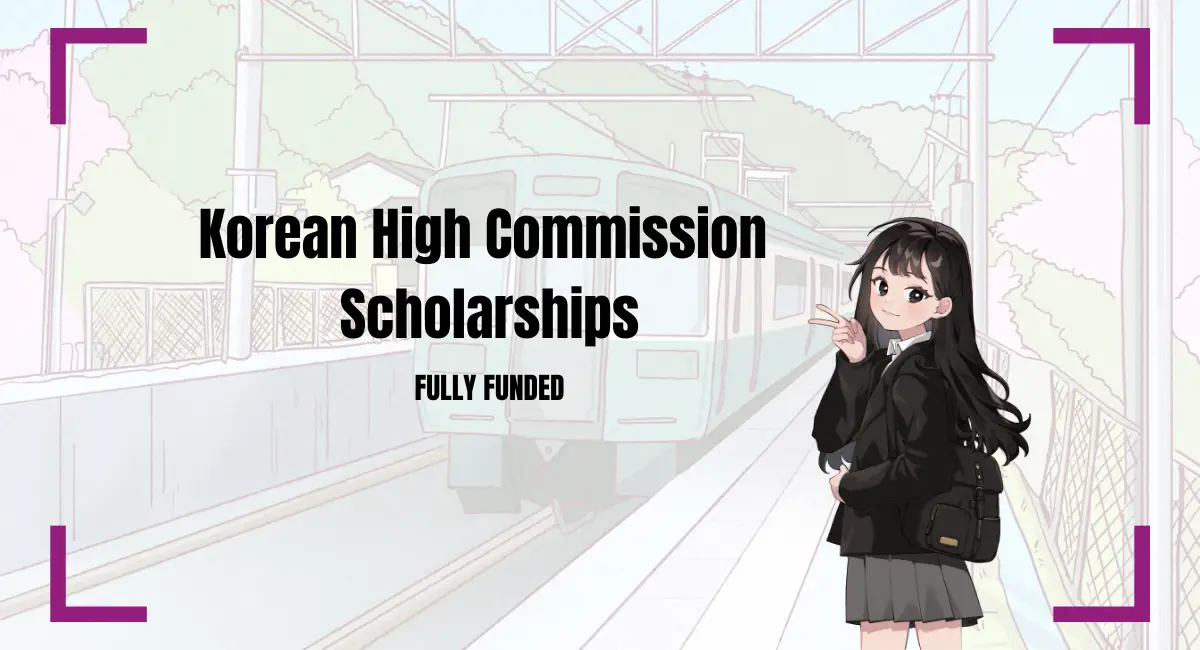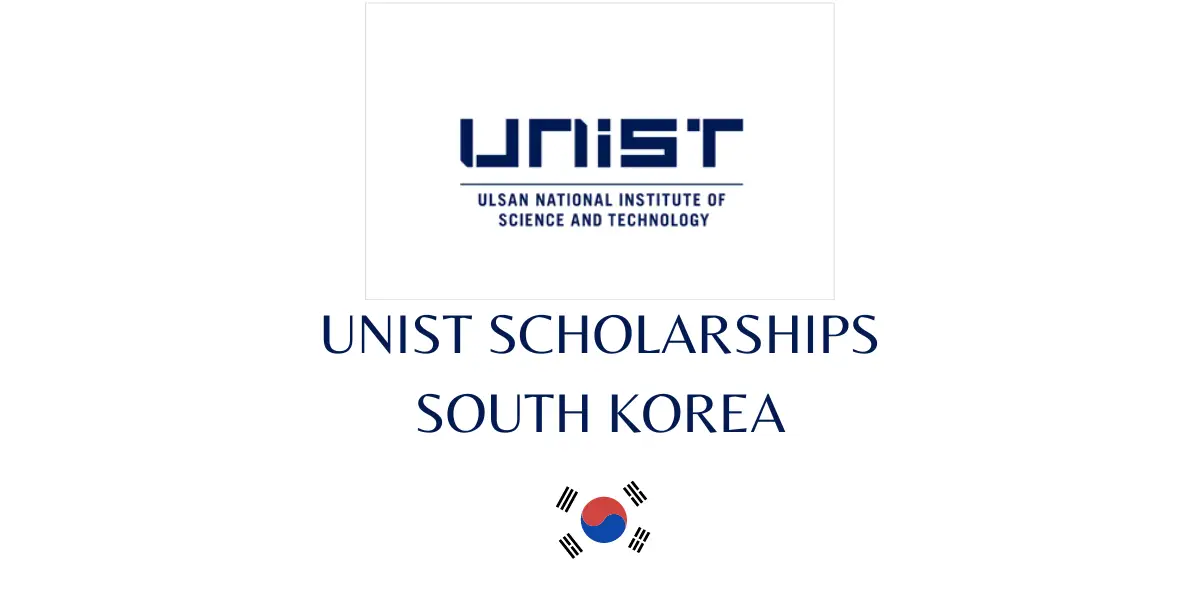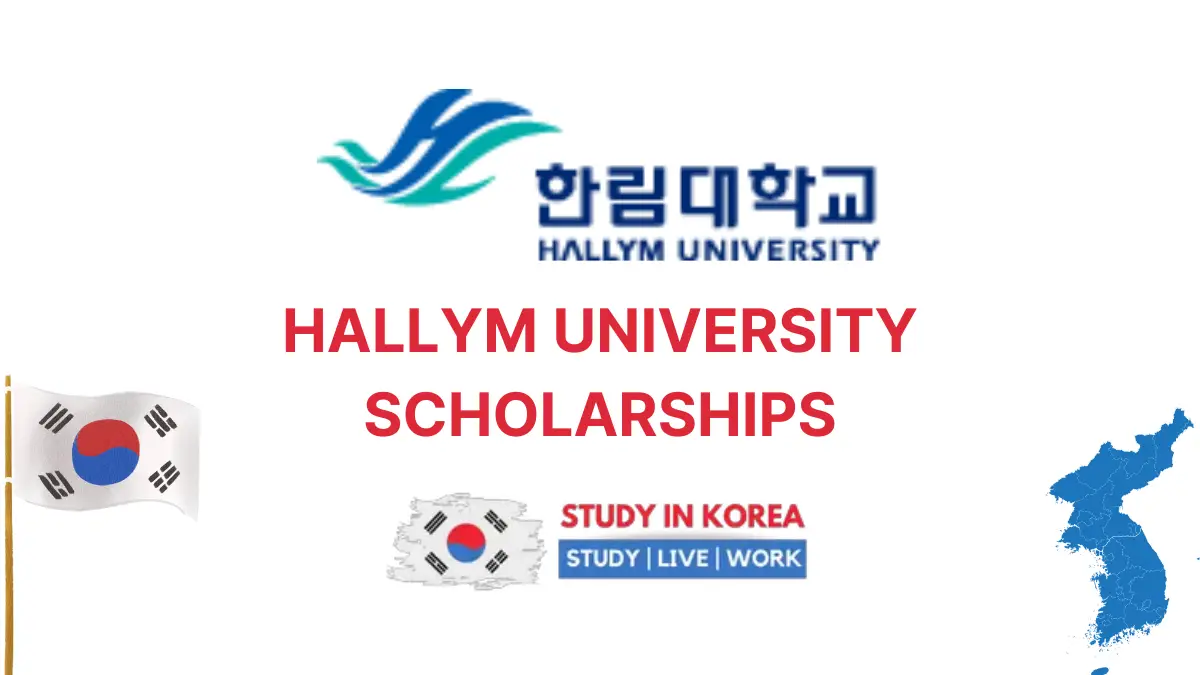
Korean High Commission Scholarships
Apply for the fully-funded scholarships for the 2023-2024 academic year offered by the Korean High Commission Scholarships Program. Apply to these international scholarship opportunities by submitting your application before the deadline. Eligible candidates are encouraged to apply and seize this amazing opportunity to study in Korea.
Korean Government offers international students with affordable and top-notch education, the Korean government is diligently working alongside esteemed Korean universities. Together, they are offering many valuable scholarships for higher education.
Check this – KAIST Undergraduate Scholarship for International students
Korean High Commission Scholarships
These prestigious scholarships are available for Bachelor’s, Master’s, and Ph.D. programs across various fields of study. Additionally, applicants from any country worldwide can apply for these programs, with or without IELTS scores.
Are you planning to pursue research or a doctoral program in Korea without incurring high expenses? If so, you can apply for Korean scholarships and fellowships specifically designed for Ph.D. studies and research activities. The Korean government is offering financial support for all degree programs to international students who wish to pursue education on a funded and fully funded basis.
Also, check this scholarship – Baekseok University Scholarship
Benefits of Korean High Commission Scholarships
The fully-funded scholarships offered by Korean universities and the Korean government offer the following benefits:
- Scholarship Rewards and Stipends
- Monthly stipend of KRW 120,000 or more
- Resettlement and Housing Allowances
- Free Round Airfare Tickets
- Research Program Funding
- Coverage for Research Tools, Thesis & Dissertation Printing Costs
- Support for Study Materials & Books
- Tuition Fee Waivers ranging from 25% to 100%
- Comprehensive Health Insurance Packages
- Counseling Sessions and E-library Access
- Coverage of South Korean Study Visa Costs
- Free one-year Korean language training
Check this – Jeonbuk National University Scholarships in Korea
List of The Korean High Commission Scholarships:
#1 GKS Invitation Program for Overseas Students:
The GKS Invitation Program, initiated by the Korean Republic Government, aims to attract international students and promote the advantages of pursuing higher education at Korean universities. Undergraduate students from ODA countries who are studying at partnered universities of the Global Korea Invitation program can apply for this scholarship opportunity, even without IELTS scores. The benefits of the GKS Invitation Scholarship program include monthly tuition grants of KRW 5,000,000, health reimbursement packages, coverage of round-trip airfare costs, monthly subsidies, and a settlement allowance of KRW 200,000 upon arrival.
The duration of the Korean scholarship is ten months for two terms or four months for one semester. To be eligible, candidates must meet the requirements and, must be international students, along with achieving a score of 80% on a 100-point scale.
#2 GKS-U Scholarships:
The Korean government, in collaboration with esteemed Korean universities, is providing Global Korea Scholarships for undergraduate students. What makes these GKS-U scholarships even more enticing is that they do not require IELTS scores. The scholarship duration is 5 years, covering the entire Bachelor’s degree program. Successful recipients will receive financial support to cover both educational and personal expenses, including air travel tickets and health allowances.
#3 KAIST University Scholarships:
KAIST University offers tuition-free education and fully-funded scholarships for undergraduate studies. Successful scholarship recipients will receive a monthly reward of KRW 300,000, along with full or partial tuition fee waivers and other benefits.
Moreover, applicants have the opportunity to apply for various scholarships such as Labor Scholarships, National Scholarships, Low-income Family Labor Scholarships, and KAIST Faculty Scholarships. For KAIST BS scholarships, acceptable language tests include IELTS, TOEFL iBT/PBT/CBT, TOEIC, and English language certificates.
#4 Seoul National University Scholarships:
SNU (Seoul National University) is another renowned institution that provides financial assistance to international students pursuing their undergraduate degrees. They offer both partially and fully-funded academic scholarships. Interested students can apply for various scholarships such as KGSP (Korean Government Scholarship Program), Overseas Korean Scholarships at KAIST, Global Korea Scholarships, and Global Hope Scholarships. The notable aspect is that these scholarships do not require IELTS or TOEFL scores.
Additionally, KAIST undergraduate scholarships offer numerous benefits to the scholarship recipients, including tuition fee waivers, living allowances, air tickets, one year of free Korean language training, and monthly stipends.
#5 Korean Government Scholarships for Overseas Students:
International students have a wonderful opportunity to receive sponsorship for their MS degrees through government scholarships for overseas students. This program offers financial support to students pursuing fundamental studies courses. Engineers, technicians, and Master’s students with a GPA of 4.0 or above can apply for this program without needing IELTS scores. The fully-funded program provided by the Korean Government covers a wide range of expenses, including academic fees, living expenses, housing costs, health insurance, and even airfare for travel.
#6 AMA Scholarship Programs:
The Arts Major Asian Scholarships is an initiative launched by the Korean government in partnership with the Korean National University of Arts to assist Asian students. This scholarship program is available for undergraduate Asian students who have exceptional artistic abilities and are enrolled in art programs at KARTS.
What makes this program even more appealing is that it provides financial support for various aspects of education. It covers living expenses of up to KRW 800,000, full-tuition fees, medical insurance, airfare, and even includes a free Korean language course.
To meet the eligibility criteria for AMA scholarships, applicants must provide scores from recognized language proficiency tests such as TOPIK, IELTS, TOEFL, or TEPS.
#7 POSCO TJ Park Foundation Scholarships:
Asian students who possess exceptional intellectual abilities and are pursuing Master’s degrees in various academic fields at Korean universities have the opportunity to avail themselves of the fully-funded POSCO TJ Park scholarships. This scholarship program is open to candidates from all academic disciplines, except for MBA students.
The online applications for POSCO TJ higher education scholarships should be submitted before May 31, 2023. It’s worth noting that there is no requirement for IELTS or TOEFL scores.
Every year, 50 students are selected as recipients of this Korean scholarship. The winners receive tuition fee waivers, allowances for settlement, and a subsidy for language proficiency.
#8 Korea-Japan Joint Higher-Education Student Exchange Scholarship:
The governments of Japan and Korea have collaborated on a joint program aimed at fostering friendship between the two countries through exchange scholarships for Master’s degrees. Each year, 15 students from Korea and Japan are chosen for this program, specifically in the fields of engineering or science. Eligible candidates must be college graduates, with a maximum age limit of 35 years.
The scholarship duration for this fully-funded program is three years, and it includes coverage for tuition fees, living stipends of KRW 1,000,000, air travel expenses, settlement fees, and more. Notably, IELTS scores are not mandatory for applicants to this program.
#9 Yonsei University Scholarships:
Yonsei University is a renowned institution that actively contributes to providing affordable education and sponsored scholarships to international students in Korea. Those who wish to pursue a Master’s degree at Yonsei University under these scholarships will get exciting benefits, including complimentary meals, accommodation, tuition fee exemption, and more.
Yonsei University offers various scholarships at the graduate school level, such as KGSP (Korean Government Scholarship Program), Early Bird Scholarships, AEARU Scholarship, and others. To meet the requirements for Yonsei MS scholarships, applicants are expected to submit their scores from TOEFL iBT, TOEIC, or IELTS.
#10 Korea University Scholarships:
Korea University, a highly reputable institution, is dedicated to providing high-quality education at an affordable cost for international students. If you are considering pursuing a Master’s degree in Korea without any financial burden, Korea University should be your top choice. They offer a wide range of MS programs and provide various partially and fully-funded scholarships that cover tuition fees and other daily expenses, ranging from 100% to 60% coverage. International students can apply for scholarships such as BK21 scholarships, KIEP scholarships, GPAS scholarships, and Academic Excellence Scholarships, among others.
For language proficiency requirements in applying for Master’s scholarships at Korea University, IELTS, TOEFL, TOPIK, and TEPS scores are accepted as valid proofs of language skills.
#11 Hankuk University Scholarships:
International researchers and doctoral students have the opportunity to secure funding for their study programs by enrolling at Hankuk University. The university is renowned for providing partial and full-tuition fee coverage, as well as support for living costs, book expenses, and more, through valuable doctoral scholarship programs.
Hankuk University offers notable scholarships specifically designed for Ph.D. programs, including UPEACE Scholarships II, HUFS Alumni Research Scholarship, Korean Government Scholarships, and others. These scholarships aim to assist deserving students in pursuing their research and doctoral studies at Hankuk University.
#12 Graduate Studies Fellowships:
The Korean Foundation, in collaboration with Korean universities, has introduced graduate studies fellowships for Ph.D. degrees. Approximately 150 students from around the globe will be selected for these fellowships, which include tuition fee waivers of different percentages. While IELTS scores are not mandatory, applicants may need to fulfill the language requirements set by the respective university they apply to.
#13 Daewoong Foundation Scholarship Program:
International students who have achieved TOPIK level l4 proficiency and are pursuing Ph.D. degrees at Korean universities can apply for the Daewoong Scholarships. This program, offered by the Daewoong Foundation, is specifically designed for overseas students who have excellent GPAs and a solid understanding of Korean culture. Interested applicants can submit their online applications until October 2023, and there is no requirement for IELTS scores.
#14 Hanyang University Scholarships:
Hanyang University is another notable institution that provides eligible doctoral students with half and full tuition fee waivers through various scholarships such as GKS scholarships, TOPIK Scholarships, and International Excellence Scholarships. Scholarship recipients will also receive financial and academic support throughout their course program.
Moreover, there is no specific requirement for IELTS scores, as applicants can demonstrate their language proficiency through other recognized English language certificates.
#15 Dongguk University Scholarships:
Lastly, we have the prestigious Dongguk University in Seoul, which is well-regarded for offering financial and academic support to students pursuing Ph.D. programs across various fields. International students from underprivileged countries have the opportunity to apply for Dongguk scholarships, which provide numerous commendable benefits. These scholarships encompass a range of options, such as SRD Scholarships, Humanities Scholarships, and Full Scholarships for Medical Device Business, among others.
In terms of language proficiency requirements, Dongguk-sponsored programs accept scores from IELTS, TOPIK, and New TEPS as valid proof of language skills.
Share this content:





